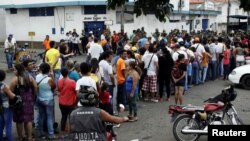Colombia said Friday that it would grant temporary legal status to more than 150,000 Venezuelans who entered the country legally and overstayed their visas, due to the deteriorating political and economic crisis in their home country.
The measure is meant as a relief for those who entered with a passport at a border checkpoint but are now in the country illegally and unable to work, exposing them to potentially abusive employers and conditions.
The protection will be valid for up to two years and let recipients work and receive social security benefits. Venezuelans must have entered on or before July 25 to qualify.
It does not apply to the estimated 100,000 or more Venezuelans who entered illegally through the nations' porous, 1,370-mile (2,200-kilometer) frontier, although officials are reviewing their situation.
Migration agency director Christian Kruger said Colombia was closely watching migratory patterns ahead of Venezuela's contentious Sunday vote for a special assembly that will be tasked with rewriting constitution. So far no changes have been noted, but Colombia has prepared contingency plans to handle a sudden influx, such as sending 1,000 officials to border points.
"Each one of them knows where to go, which team they are with," Kruger said.
Crossing with ease
The Andean neighbors have historically had a fluid border relationship, with many crossing on a daily basis to go to school or work.
Decades ago 4 million Colombians migrated to Venezuela when their country was mired in armed conflict and Venezuela's oil-rich economy was booming. More recently that tide has reversed, with many of those same migrants returning to Colombia to get away from triple-digit inflation, food and medical shortages, and a homicide rate that is among the world's highest.
An estimated 25,000 Venezuelans enter Colombia daily at legal crossing points, either to buy food other supplies or to visit family. About the same number return each day, according to Colombian migration officials.
Other Andean nations including Ecuador and Peru also say they have seen an uptick in Venezuelan migrants, though the Venezuelan government denies that. Officials in Venezuela have not released migration statistics in more than a decade.
Gladys Yambay, head of the Migration Control Unit in Rumichaca, Ecuador, on the border with Colombia, said the increase in Venezuelans arriving this week required the opening of four additional processing windows.
Hundreds have been lining up with suitcases in hand, she said.
